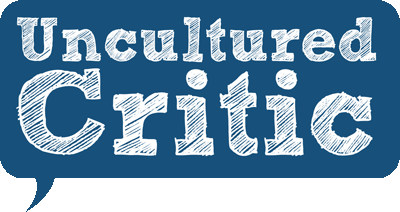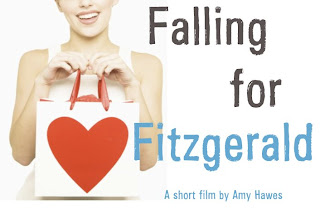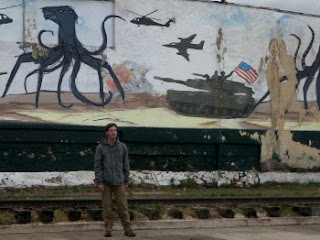Thursday, January 27, 2011
Book Review: The Illumination by Kevin Brockmeier
Sometimes a good book is hard to read. Sometimes a hard book is good to read. Sometimes, a book is as good as it is bad. The Illumination was mostly the latter.
'The Illumination' is a phenomenon that suddenly occurs across the world, where physical aches and pains light up for all to see, and suffering becomes visible. The book follows 6 protagonists in a story hand-off that is spectacularly evenly divided and yet totally unsatisfying. Initially, we find ourselves in the company of a data analyst whose bitter ex-husband sends her a difficult package, opening which she slices her finger. While in hospital, a woman who has been in a car crash gives her a journal filled with love notes from her husband, who is presumed dead. The journal becomes the thread that runs through the book as it finds its way into the hands of each protagonist. But it's all been constructed by an amateur seamstress, and the result is pretty dodgy.
The idea behind all of this is that there is beauty in pain, but as the lives of these characters interweave in subtle ways, it never feels fully satisfying. Passages are filled with endless beautiful prose, but it's essentially the same scene sewn together in slightly different permutations over and over. The result is a novel that feels like the same short story narrated by six different characters read in quick succession.
If it made any sense, I'd recommend reading the first two-and-a-half chapters of this book. Instead, I'm going to have to say that The Illumination simply isn't fully-formed, and definitely won't blow your mind.
Book #3: ★★★★★
Next book (although I said the same thing last time): One Day by David Nicholls
What have you read lately? Give me your recommendations!
Monday, January 24, 2011
Guest Post: Falling for Fitzgerald, A Crowdfunding Project
It's one thing to sit around and write about low-budget filmmaking, and another to go out and raise the money to make your own. A friend of mine, Amy Hawes, is currently campaigning for funding to make her short film, Falling for Fitzgerald. It's a great project and a charming story, so I asked her to share her story here. I hope that you'll all be inspired to pick up a camera, or live vicariously through Amy and donate!
Eighty-seven days ago, on Friday the 26th of November, 2010, I set up a page on American crowd-funding website IndieGoGo. I had written a short story, called “Unlucky for Some”, which I then wrote into a script entitled “Falling for Fitzgerald”. I wanted to raise some money to make the film myself, a few months down the line.
--
Eighty-seven days ago, on Friday the 26th of November, 2010, I set up a page on American crowd-funding website IndieGoGo. I had written a short story, called “Unlucky for Some”, which I then wrote into a script entitled “Falling for Fitzgerald”. I wanted to raise some money to make the film myself, a few months down the line.
Anyone can make a short film, using absolutely zero money. I have done it, several times before. It’s about getting the use of free equipment (i.e. get involved with student film societies, charities, or borrow off acquaintances), begging friends of friends to come and be the cast and then getting hold of some editing software and basically putting the hours in. Anyone can do that. What I wanted to do this time, as I repeatedly told people, is scrape together a reasonable budget. A decent budget. One that will enable me to not only pay those involved, but hire quality equipment, feed everybody really well and get the film into film festivals in Edinburgh, Glasgow, London and beyond.
With this in mind, I set up my IndieGoGo page, wittered on Twitter and bothered all my Facebook friends. I then essentially went about my life. Within 3 hours I had $5 that I hadn’t had previously to go towards making my film.
The way crowd-funding using a site like IndieGoGo works is by offering perks for donations. You don’t just pledge donations- you help out the film by buying unique gifts. These include experiences like a violin lesson, an extra part in the film or invitation to the Glasgow premiere. They include tangible things like photographs and DVDs. Sponsorship deals like advertising space on the DVD and a free website video. And pretty cool gifts like being credited as an Executive Producer and getting your name in the credits.
Fast-forward to tonight and I have 9 days left of my IndieGoGo campaign. I have raised a fantastic $1250 (just under £800) to make my film with, which is utterly spectacular. All my wittering and twittering has also brought my endeavour to the attention of a helpful script editor and BBC camera man, both of whom have pledged their services for when the time comes. It has also secured me the use of a free camera, dolly, lights and jib (that’s a funky camera crane to those not in the know), which frees up about £400 of the budget that can now be spent elsewhere.
So I’ve got nine days left to raise any more money I can scrape together. My target for now is $1600, which will give me a cool one thousand pounds to make the film. So I’ve got $350 left to raise, in the next nine days.
Please consider donating to “Falling for Fitzgerald”- it’s a bleak comedy about a woman on the wrong side of twenty-five and unhappy with the way her life is going. In order to get a handle on things like her shit job and her boring life, she decides that becoming obsessively attached to one man can solve all of her problems…
If you’d like to find out more about “Falling for Fitzgerald”, please visit www.amyhawes.com or email me at . To donate, please visit http://www.indiegogo.com/Falling-for-Fitzgerald
Thanks for reading!
Saturday, January 15, 2011
Book Review: Candide by Voltaire
A bizarre array of events dwell within the pages of this novel. While Voltaire is one of my top wordsmiths for quotations (and check out that hair!), Candide was initially exquisite and later bafflingly, maddeningly monotonous.
Rather than bore you with the details, allow me to share some of my favourite passages from the early chapters.
From the metaphisico-theologo-cosmolonigologist Master Pangloss:
"It is demonstrable," said he, "that things cannot be otherwise than as they are; for as all things have been created for some end, they must necessarily be created for the best end. Observe, for instance, the nose is formed for spectacles, therefore we wear spectacles. The legs are visibly designed for stockings, accordingly we wear stockings. Stones were made to be hewn and to construct castles, therefore My Lord has a magnificent castle; for the greatest baron in the province ought to be the best lodged. Swine were intended to be eaten, therefore we eat pork all the year round: and they, who assert that everything is right, do not express themselves correctly; should say that everything is best."It's pretty clear why Pangloss is probably Voltaire's best-remembered character (I present this as fact mostly based on his prominence in Jeopardy clues).
Candide is happy-go-lucky, blithely bound to the world and held by absurd passions; never feeling wronged and always moving forward, to the point that he, like Pangloss, sticks to his guns as though unaware that he has the ability to make his own decisions. The story tumbles along in Candide's wake, never resolving anything except the incorrectly-assumed deaths of many of his closest relations.
Similarly, Candide's relationship with the Baroness' daughter, Miss Cunegund, is never as sweet and magical as their first encounters.
The miss dropped her handkerchief, the young man picked it up. She innocently took hold of his hand, and he as innocently kissed hers with a warmth, a sensibility, a grace-all very particular; their lips met; their eyes sparkled; their knees trembled; their hands strayed. The Baron chanced to come by; he beheld the cause and effect, and, without hesitation, saluted Candide with some notable kicks in the breech and drove him out of doors. The lovely Miss Cunegund fainted away, and, as soon as she came to herself, the Baroness boxed her ears. Thus a general consternation was spread over this most magnificent and most agreeable of all possible castles.
Though it begins with so much promise, the extent of Candide's timelessness wears off after the first couple of chapters. A delightful beginning to a disappointing middle and not the best of all possible endings.
C'est la vie!
Book #2: ★★★★★
Next book: One Day by David Nicholls
Tuesday, January 4, 2011
Interview: Gareth Edwards on Monsters (Extended Feature)
Independent filmmaking is a fickle business. With the recent closure of the UK Film Council and huge budget cuts for the arts, this is a fresh wound in the British film industry model. Funding is hard to come by, and in an industry where low and micro-budget films cost anything from £26,761 to £990,797 (according to UK Film Council, 2008), newcomer Gareth Edwards sagely remarks, “you say the words ‘cheap’ and ‘potentially commercial’ to producers, and you’ve hit the jackpot.”
Gareth Edwards is the little fish in the big pond of post-apocalyptic sci-fi. Despite its low budget, guerrilla filmmaking style, and grungy CG aesthetic, Monsters has had a snowball year of growth, buzz, and - eventually - hype. "Put it this way: you can't play in the filmmaking equivalent of the World Cup Final without embracing the Hollywood machine," says Edwards. "It's not a business model to emulate forever…. it's more like, it's great you can make your debut film this way, and then maybe you'll get a better opportunity."
Monsters is part indie sci-fi, part road movie, and potential CG cult sensation. Fascinated with beginning where most apocalypse stories end, the director set Monsters post-post-alien invasion. “I found the idea of nobody really reacting anymore interesting. If War of the Worlds was September 11th, then this film would be like Afghanistan,” he says. Taking place six years after the crash of a NASA probe carrying extra-terrestrial life forms which scattered its alien cargo across Central America, the film follows charming photojournalist Andrew (Scoot McNairy), who is charged with the safe return of his editor’s daughter, the reserved, pixie-haired Samantha (Whitney Able) to her fiance. Their attempts to leave the quarantined zone before the aliens’ annual migration are thwarted and they must make the long pilgrimage home on foot.
The first time filmmaker took a crew of four (himself, two actors, and editor Colin Goudie), on an arduous shoot through Mexico, Belize and Guatemala: a huge, but ultimately lucrative, challenge. "I often think, "What would I have done if Vertigo hadn't given us the money? The reality is, I'd have financed it myself…. but if it had been my own money, I would have called it quits at some point and had a break - then, inevitably, never returned to it. But I couldn't afford to ruin it, I had to deliver what I had promised."
Produced by Vertigo Films, the exact budget has been a subject of debate, but is generally believed to be under half a million pounds: little more than travel expenses, equipment, and wages. “The effects budget was nothing, because that was me,” says Edwards, “and I don’t know the exact budget. The reason I don’t know is that because most of the money went on wages. It’s in the low six-figures, I would guess.”
The potential of high returns on low budget films with Hollywood-standard visual effects is proving to be a promising market. Hollywood visual effects specialists Colin and Greg Strause recently made a move into directing - first as directors of Aliens vs Predator Return (2007), and then with their own low budget feature, Skyline (2010). With an estimated budget of $10 million, the film grossed over $21 million, making the Brothers Strause one of Hollywood’s success stories of 2010. By comparison, Edwards’ Monsters has an estimated budget of $800,000 and, having grossed $229,192 so far, was a quiet hit at a number of film festivals. A slow-burner, it is becoming an indie hit rather than a box office success.
Frustrated with his lack of practical education at film school, Edwards, instead of pursuing life as a filmmaker, made a similar side-step into computer graphics. But that’s not where his ambitions lay. "Doing visual effects for a living is like being a gynaecologist. When you do it every day at work, it doesn’t turn you on any more.” This career move proved a neat segue back into independent filmmaking, cementing a certain element of his aesthetic that is a prevalent feature in Monsters. “I really hate watching Hollywood films where you can tell they’ve made lots of effects people break their backs to do these shots, but the final emotional impact is nothing. So it was really important for me to put the record straight: what I did with this film is not technically groundbreaking, but I hope the choices that were made were to be bold and throw away visual effects, not make a big deal of them."
Whimsically dubbed “Brief Encounters of the Third Kind” in the editing suite, Monsters’ strength is its emotional depth. A couple in real life, Scoot and Whitney fit the bill for the lead characters, but he still needed convincing. “The chemistry is so important. There needed to be a real chemistry between the two people, and I didn't want to leave it to chance that it wouldn't be there. I didn't know them then, and I didn't want to risk it.” Despite his initial disappointment with Whitney’s good looks, he says, “I didn't want to have her because it'd be like a Hollywood movie, and we were trying to fight in the opposite direction of that. So, I said all this, and they basically flew me over and I slept on their sofa for 5 days and got to know them... [Whitney]'s not the person you think you're going to meet, and she was really keen to do something that showed that as well.”
And Whitney wasn’t the only one with something to prove. In establishing himself as a director, Edwards was very focused on his audience. Despite touring film festivals around the world with a film about two Americans, he hopes for success at home. “It's really interesting because territories, nations, countries, they do sort of have their own personalities,” he says. “I'm obviously British and I feel like I know the British personality, so if I can't make a film that people in Britain like then I'm in trouble... I’m more nervous about how it does here than the rest of the world, because this is the [personality] I'm supposed to know.”
His British sarcasm is a mainstay in all of his press appearances, but his passion for film and aims to make an organic, off-beat, yet appealing picture is most memorable. Having
been through the guerilla filmmaking process, his perspective is clear. “What's great about it is that if everything completely goes wrong, I can do it again. It feels like a really nice safety net,” he says. “It's a young person's game, making a debut film. It'd be hard if you had kids and were settling down, it'd be a big financial risk.”
“I do feel like we had something to say about how this film was made and I wanted it to help other people who want to do something. Make them think, good, there you go, see. I can go off and do that,” says Edwards, who is clearly an advocate for first-time filmmakers. His advice? “Don't be someone who is going to make a film. It sounds so obvious that it sounds stupid. But really, listen to these words and think about it. Be someone who is making a film.” After years in visual effects, it was a lesson hard learned for him. “It's so easy to put things off, I did for 10 years. I was "try"ing for a long time, and really what I was doing was putting it off because I was afraid of failing. By sheer accident I got into a situation where dates were put down on paper and I had to do it.”
Despite recent commentary decrying the abolishment of the UK Film Council, Edwards has pioneered a movement for low budget films with high budget aesthetics. Focusing on story and character over flashy images, it hasn’t always proved popular, but is a promising start to a new grassroots approach to filmmaking that will no doubt attract and inspire a younger generation of filmmakers. Moving away from the Film Council-funded British cinema of Stephen Frears and Tom Hooper (director of Britain’s biggest Oscar-bait of the year, The King’s Speech), a revival is in action that has the potential to become Britain’s new cultural cinema. Forget expensive blockbusters, homegrown competition is a springboard model for the British film industry’s future.
Labels: edinburgh international film festival, feature, interview
Subscribe to:





